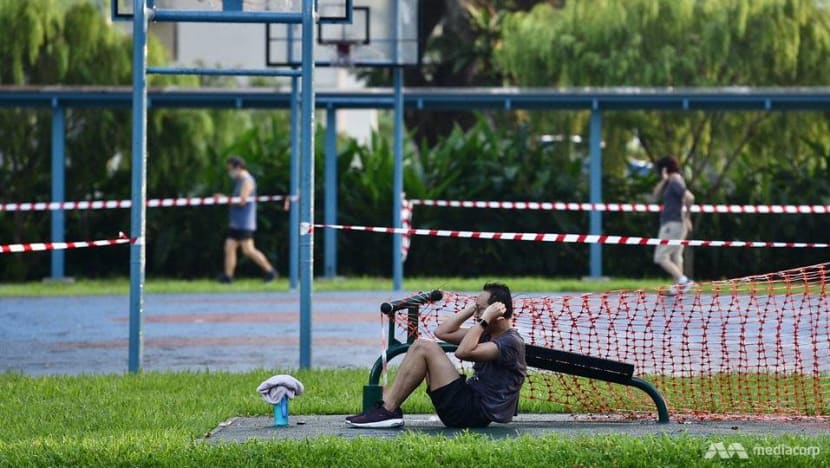Physical activity fell, but more people willing to seek mental health help during pandemic: MOH survey
New work arrangements and COVID-19 restrictions on sports facilities could have contributed to less physical activity during the pandemic, says the Health Ministry.

A man exercises at a workout corner in Toa Payoh amid the COVID-19 pandemic. (Photo: CNA/Jeremy Long)
SINGAPORE: Levels of physical activity in Singapore fell during the COVID-19 pandemic, but more people were willing to seek help for mental health, the Ministry of Health's (MOH) latest survey showed.
The National Population Health Survey 2021 findings released on Tuesday (Dec 20) tracks the health and risk factors of Singapore residents aged 18 to 74, using self-reported data from household interviews.
The survey period was from July 2020 to June 2021, which spanned the country's Phase 2 and Phase 3 reopening from the "circuit breaker", with some COVID-19 safe management measures still in place.
The most recent comparable data is from the 2019 edition of the survey. The 2020 survey incorporates additional data from health examinations, which is only included every two years.
The latest survey found that 71.1 per cent of residents had sufficient physical activity, defined as at least 150 minutes of moderate intensity physical activity in a week. This was a significant decrease from 80.1 per cent in 2019, said MOH.
Commuting was the largest contributor to total physical activity, at 47 per cent. The remainder was split almost evenly between work-related physical activity, including household chores, and leisure-time activity such as sports, exercise and recreation.
The survey found that 32.5 per cent of residents engaged in regular exercise during their leisure time in 2021, which was a slight decline of 2.7 percentage points from 2019.
New work arrangements, such as work-from-home and hybrid work set-ups, as well as COVID-19 restrictions on sports and recreational facilities and gardens and parks possibly contributed to the decline in physical activity across all domains, said MOH.
The decline in the proportion of residents with sufficient physical activity was observed in most age groups.
Young adults in the 18 to 29 years age group (76.3 per cent) had the highest level of sufficient total physical activity while the older adults aged 60 to 74 years had the lowest proportion, at 65.1 per cent.
In a press release, MOH said it would enhance the National Steps Challenge to support the Healthier SG initiative in encouraging more active lifestyles, without giving details about the enhancements.
The ministry also said it would continue to improve accessibility to exercise programmes, including expanding choices, taking programmes online and creating more exercise sessions in community spaces.
MENTAL HEALTH
More Singapore residents were willing to seek professional help for their mental health to cope with stress, with the proportion rising to 58.3 per cent compared to 47.8 per cent in 2019.
MOH said this reflected "heightened public awareness of mental wellness, and reduced stigma around mental conditions".
But it added that more effort is needed to strengthen informal and community support. Informal support networks refer to friends, relatives, colleagues, religious leaders and teachers in school, said the survey report.
The survey found the proportion of residents willing to seek help from such informal support networks dropped "significantly" to 69.1 per cent in 2021, down from 74.5 per cent in 2019.
Seniors aged 60 to 74 were the age group least willing to seek help from either healthcare professionals or informal support networks.
Overall, more residents were willing to seek help from informal support networks than healthcare professionals.
Women were more willing to seek help from healthcare professionals and informal support networks compared to men.
HEALTH SCREENINGS, VACCINATIONS AND SMOKING
As fewer people went for chronic disease screening during the pandemic, there may be "significant" levels of undiagnosed chronic conditions, said MOH.
The survey found that participation in chronic disease screening fell from 66.3 per cent in 2019 to 59.2 per cent in 2021. Screenings for breast, cervical and colorectal cancers also saw lower participation rates.
Deferment of non-urgent medical services during the pandemic may have led to the decline in health screening participation, said the ministry.
The self-reported numbers of residents with diabetes, high cholesterol and high blood pressure were "comparable" to 2019, but should be treated with caution given the screening participation rates, it added.
The survey also found that seniors aged 65 to 74 had higher uptake of their recommended flu and pneumococcal vaccinations, with the take-up rate rising by 8.2 and 12.1 percentage points respectively compared to 2019.
Prevalence of daily smoking and binge drinking remained stable among residents, at 10.4 per cent and 9.6 per cent respectively. The survey does not cover the use of e-vaporisers, or vapes, which are banned in Singapore.
MOH said it will enhance educational efforts in schools to prevent smoking initiation from young. It previously announced that a digital campaign on the negative health effects of vaping would be rolled out in early 2023.




















